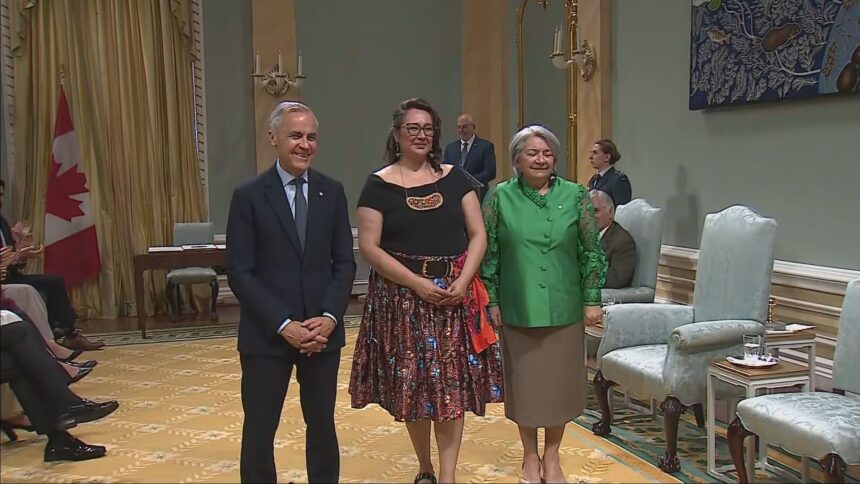Indigenous Services Minister Mandy Gull-Masty says she told Prime Minister Mark Carney that fixing the Jordan’s Principal program and First Nations child welfare system are two of her top five priorities for the coming 12 months. ”This summer, there was a lot of discussion when I did my tours, when I engaged with the community, I heard many different messages. I think the important thing that we need to focus on is really that collaborative aspect,” Gull-Masty told APTN News. “Ensuring that there’s an outcome for kids. That’s really, really important to me. It is one of the priorities that I have put in front of the prime minister.” Along with Jordan’s Principle and child welfare reform, “there are many others,” she said, but she will wait to speak to her detailed plan for the year as part of the budget process on Nov 4. The Jordan’s Principle program is under fire from communities across the country for being unreliable – and unworkable. A Feb. 10 operational bulletin added new rules for applications and restricted services, meaning frontline workers have struggled to keep services for children running and in some cases, programs have been shut down. The program is named after Jordan River Anderson from Norway House Cree Nation. The boy had a number of health issues and was forced to live his entire, short life in hospital because Canada and the province of Manitoba argued over who would pay for his medical expenses at home. Plans to reform the discriminatory First Nations child welfare system have stumbled along for nearly a decade. On the day the federal budget is released, ministers will jointly release details on three to five “key objectives” for the year that they set at the request of Carney. According to the Canadian Press, Carney told them in a July 8 letter to identify their priorities within three weeks, using mostly the resources and authority already at hand. “You are expected and empowered to lead, and to bring new ideas, clear focus, and decisive action to your work,” the letter said. “The submissions should reflect your strategic and political assessment of the key actions our government will deliver for Canadians.” The Canadian Press got a copy of the three-page letter through the Access to Information Act. Back in May, Carney had already laid out seven broad goals for his cabinet: closer ties with the U.S., building a single Canadian economy, lowering costs, making housing more affordable, protecting sovereignty, attracting top global talent, and cutting government spending. The July letter went further, telling ministers to put forward specific initiatives to “contribute to the success” of those ambitions. “A core part of your responsibilities is driving our shared missions, including the priorities outlined in the mandate letter, the Speech from the Throne, and our campaign commitments,” the letter says. “To be successful as a ministry, we must demonstrate mastery over the core competencies of governing, including service delivery to Canadians.” Carney cautioned them not to just repeat every campaign promise tied to their portfolios. Instead, they should zero in on a handful of priorities for the next 12 months. By July 28, ministers were expected to send in a draft Mission Action Plan for each objective. The plans had to spell out what outcomes Canadians would see — for example, “life is more affordable, housing is within reach, Canadians are safe at home.” They also had to include the steps needed to make it happen, a timeline, and a way to measure results. “Indicators should focus on what Canadians experience and feel, rather than on what the government is doing,” the letter said. “For example, number of houses built, not number of grants issued.” Privy Council Office spokesman Pierre-Alain Bujold said every minister responded. Their submissions were used to shape the government’s fall priorities, which cabinet discussed at its planning forum in September. The letter added that ministers could suggest measures needing new laws or funding, “with the understanding that funding and parliamentary time will be limited.” The Privy Council Office is now tracking objectives and outcomes. Cabinet committees are responsible for monitoring progress, and if a plan falls behind, committee chairs must flag it to the priorities and planning committee. That committee will then work out fixes, “with external expertise as required.” With files from Canadian Press Continue Reading
ISC Minister says fixing Jordans Principle, child welfare, are at the top her priority list

Leave a Comment










